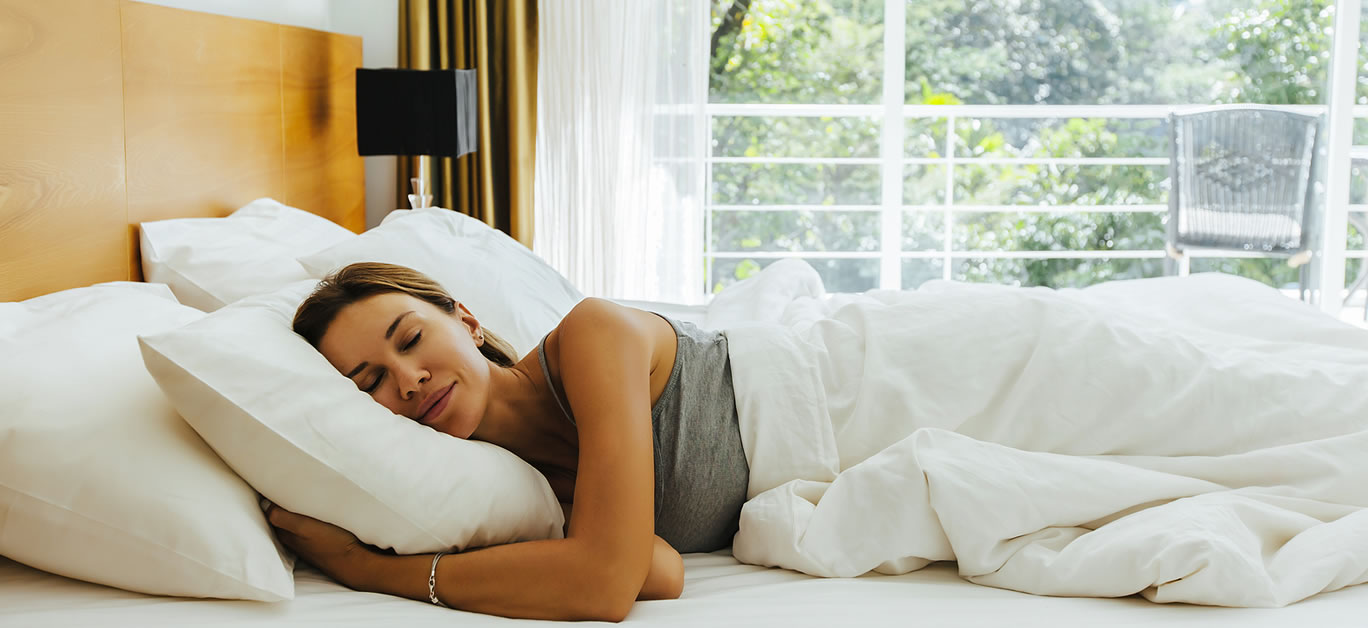Side sleepers, back sleepers, snorers, those with back issues–when it comes to buying a mattress, it can be difficult to know if you are buying the right one for your specific needs. Add to that the fact that you may very well be sharing a bed with someone who has altogether different needs, where do you even begin?
All of us want a decent night of sleep – eradicate insomnia, stop the tossing and turning in the night, and simply wake up from a deep slumber feeling refreshed. There are many factors to consider when creating the perfect environment for restful sleep. Additionally, there are many variables within ourselves that will dictate whether we are able to relax to get some much-needed REM sleep.
If you struggle with drifting off, a holistic approach is certainly going to be beneficial for you. This involves creating a relaxing room with comforting décor and furnishings, ensuring you are eating well, freeing yourself of stress (easier said than done, but something to work on), and, most importantly, ensuring that you have the right mattress for your needs.
You may ask yourself, are there better mattresses for different people and their needs? The answer is, yes! So, whatever type of sleeper you are and whatever physical issues you may have that are affecting your sleep, read on to find the right mattress for you.
Snorers

With around half of the population taking part at some point in their lives, snoring is rather common, and, for the most part, fortunately, isn’t a serious condition. However, if you have a partner sharing a bed with you who feels differently, then you may be looking to solve this problem.
Snoring can be down to your lifestyle, but, mostly, it’s an issue when you sleep on your back. So, instead of attaching a tennis ball to the back of your sleepwear to discourage you from lying in that position at the night, consider finding a mattress suitable for you. For a more detailed guide on the best mattresses to buy for a snorer in the family, check out BedAdvisor.com’s article, which also includes useful information to help solve the condition.
Side sleepers

Said to be the most common sleeping position, those who sleep on their sides should be looking for a mattress firm enough to offer full support, but also soft enough so that your hips and shoulders can sink suitably for a comfortable slumber. Confusing enough for you? We thought so!
You should be looking for a pocket sprung option with a deeper top layer for shoulder and hip comfort, and the top layer can be memory foam, pillow top, gel, or latex, depending on your personal preferences. Memory foam offers good pressure relief while contouring to your shape, though it can make you hot while you sleep. Pillow top layers provide cushy comfort. Gel is not only breathable and cooling, but provides comfort, too. Lastly, latex offers better bounce back than memory foam due to its highly responsive nature.
If you can get to a store to try out a few different options, then do so – focusing on the medium options (medium, medium to soft, and medium to firm). However, most mattress companies offer lengthy trial periods, so if you can’t try before you buy, you can buy and send it back if it isn’t suitable for you.
Front sleepers

Though it may be tempting to opt for a soft, cushy mattress, medium to medium firm mattress are better for front sleepers as you want to have enough support for your spine to avoid it overarching as you sleep. Hence, avoid firm mattresses as your spine will need to maintain a natural, healthy curve.
Medium mattresses are also beneficial if you have a partner who sleeps in a different position as they should provide an appropriate level of support for you both. Pocket sprung mattresses with a layer of memory foam, latex, or gel will be best for you.
Though this may be the most comfortable position, be aware of your neck as sleeping on your front can cause or exacerbate neck issues. In this case, opt for a slimmer pillow to avoid your head being raised too high and one that correctly supports you for premium spinal alignment. Also, be sure to change your pillows every one to two years to ensure full support.
Back sleeper

Provided that you’re not a heavy snorer when you sleep on your back (if this is the case, see above), then you should look for something a little firmer to provide you with the most comfort and support for your spine and other areas of your body. In fact, this is thought to be the best way to sleep due to the relief it brings by naturally aligning with your spine.
Even weight distribution is key. While pocket sprung and open coil mattresses are good options, an orthopaedic mattress will be a great choice, especially if you’re looking for something that provides expert back care. Choose a medium-firm or firm mattress and opt for a slim pillow to avoid your head being raised too high.
To throw another factor into the mix, your body weight will also have an impact on the mattress you should buy. All bodies should sink into a mattress for it to provide the correct level of support for your body and spine while you partake in those essential eight hours of deep rest. Those on the lighter end of the scale should compress the materials in the mattress enough to experience pressure relief on their body, while heavier people should avoid buying a mattress that is not firm enough to support their body weight.
Of course, there will be other factors, such as sleeping position, snoring, and back issues that need to be addressed when finding the right mattress for you. So, keep all factors in mind when seeking out your most suitable pick.






















